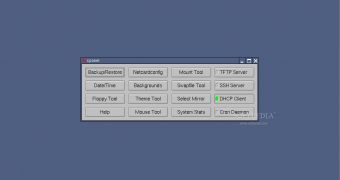Robert Shingledecker, founder of the Tiny Core Linux project, announced yesterday, March 10th, the release of Tiny Core Linux 1.2, a very small Linux distribution that is only 10 MB in size. Based on the Linux kernel 2.6, this core desktop uses BusyBox – a tool that provides many useful UNIX utilities in one single package, TinyX – an embeddable X Window server, FLTK (Fast Light Toolkit) – a cross-platform Graphical User Interface (GUI) that provides simple functionality, and the JWM (Joe's Window Manager) – a window manager written in C for the X11 Window System.
Being only a core that facilitates a fast boot into a minimal X desktop with wired Internet access, this distribution is not a complete desktop and doesn't support all hardware. Users can customize their installation by adding new applications or additional hardware support, transforming Tiny Core into a desktop, netbook, appliance or server Linux distribution. Tiny Core Linux 1.2 highlights:
· A new tcz-symlinker that significantly improves boot and on-demand tcz handling; · The udev rules 90-permission.rules for usb were updated; · Other devices are now better supported through an updated mnttool; · The unused /etc/networks, /etc/network.conf and /mnt/auto files were removed; · Fixed the missing Apps menu with persistent /opt; · The un-needed loop in /root/.profile was dropped; · Version command was added; · Support for Traditional (or Scatter Mode) installation was improved; · Fixed the duplicate icons in Scatter Mode; · Suid is now enabled on tclocal mounts; · The pci.ids was updated.
Tiny Core Linux can operate in four modes: Cloud/Internet – the default boot mode where the system boots entirely in the RAM, PPR/TCE mode – the user has to specify a persistent storage partition and can use the TCE repository, PPR/TCZ mode is the same as PPR/TCE, except it uses the TCZ extension type, and the PPI/TCE mode that installs extensions on a Linux partition or a loop back file.
Download Tiny Core Linux 1.2 right now from Softpedia.

 14 DAY TRIAL //
14 DAY TRIAL //